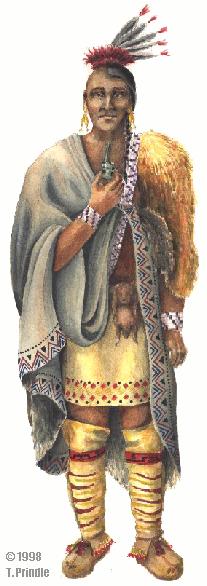|
Native American regalia is special dress, ornamentation, jewelry and other paraphernalia which is worn for particular occasions such as festivals and dances, ceremonies and rituals. The style of dress, symbols used in designs, colors in beadwork and other ornaments can help identify the wearer’s tribe or family. Specific aspects of regalia can also indicate the wearer’s political or marital status. New England Native Americans have a unique style of regalia different from other areas. One piece center-seam moccasins, porcupine quill, moosehair and floral beadwork appliqué, wampum belts, bracelets and headbands, brass and copper ornaments and certain kinds of featherwork are distinctive of New England. Traditionally in deer, elk, moose and other skins or hand-woven materials, Northeastern Native American Regalia now incorporates trade cloth, glass beads and other items of European origin.
Traditionally, regalia is set aside and worn only for special gatherings. Certain outfits or elements of clothing were undoubtedly worn only for particular ceremonies. Some regalia is sacred or has been ritually purified or blessed ("smudged" or wiped with the smoke of sacred herbs). Always seek permission before handling someone else’s special dress to avoid spiritual contamination of their regalia. Today, wearing regalia is a way to maintain Native American Heritage, to take pride in and pass on old traditions and help create new ones. Many traditional elements of pre-European contact regalia have been preserved since ancient times, but new styles of dance regalia evolved with the development of the Pow Wow festival.
|

Man from Southern New England ~ circa 1600
|

